How Family Background Shapes Social Work with Children and Families
VerifiedAdded on 2022/09/18
|5
|1385
|18
Essay
AI Summary
This essay reflects on the author's personal family background and its influence on their social work practice with children, youth, and families. The author, a family counsellor, emphasizes the significance of family structure, communication, and conflict resolution skills gained from their upbringing in a joint family. They discuss how their experiences inform their approach to facilitating communication, resolving conflicts, and addressing harassment within families. The essay highlights the importance of understanding family dynamics and applying values and ethics learned from their family to support children and parents in challenging situations. The author provides insights into the challenges faced by families and their role in providing guidance and assistance to navigate those challenges. Ultimately, the essay underscores the crucial role of family in shaping individuals and the impact of personal experiences on professional practice.
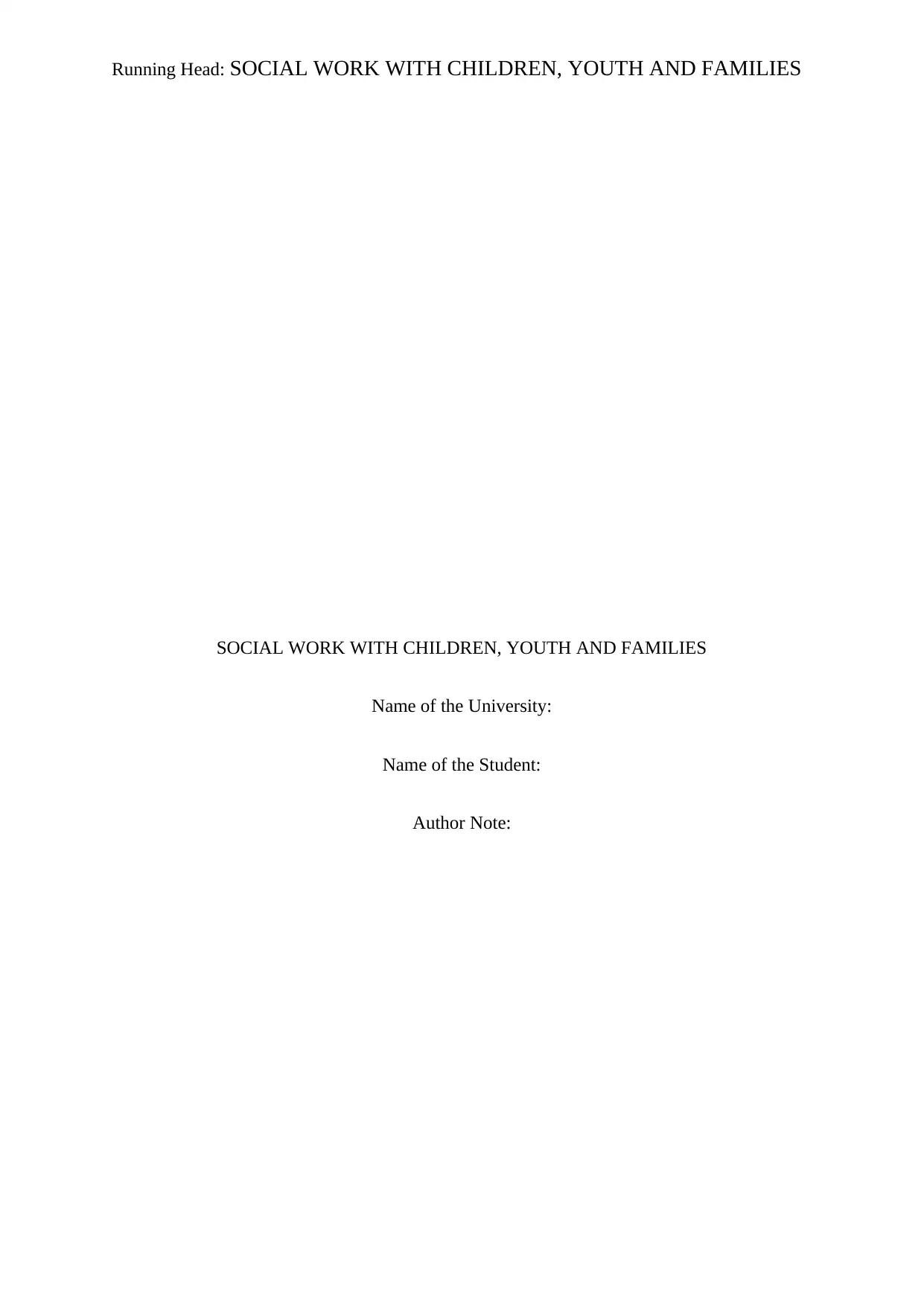
Running Head: SOCIAL WORK WITH CHILDREN, YOUTH AND FAMILIES
SOCIAL WORK WITH CHILDREN, YOUTH AND FAMILIES
Name of the University:
Name of the Student:
Author Note:
SOCIAL WORK WITH CHILDREN, YOUTH AND FAMILIES
Name of the University:
Name of the Student:
Author Note:
Paraphrase This Document
Need a fresh take? Get an instant paraphrase of this document with our AI Paraphraser
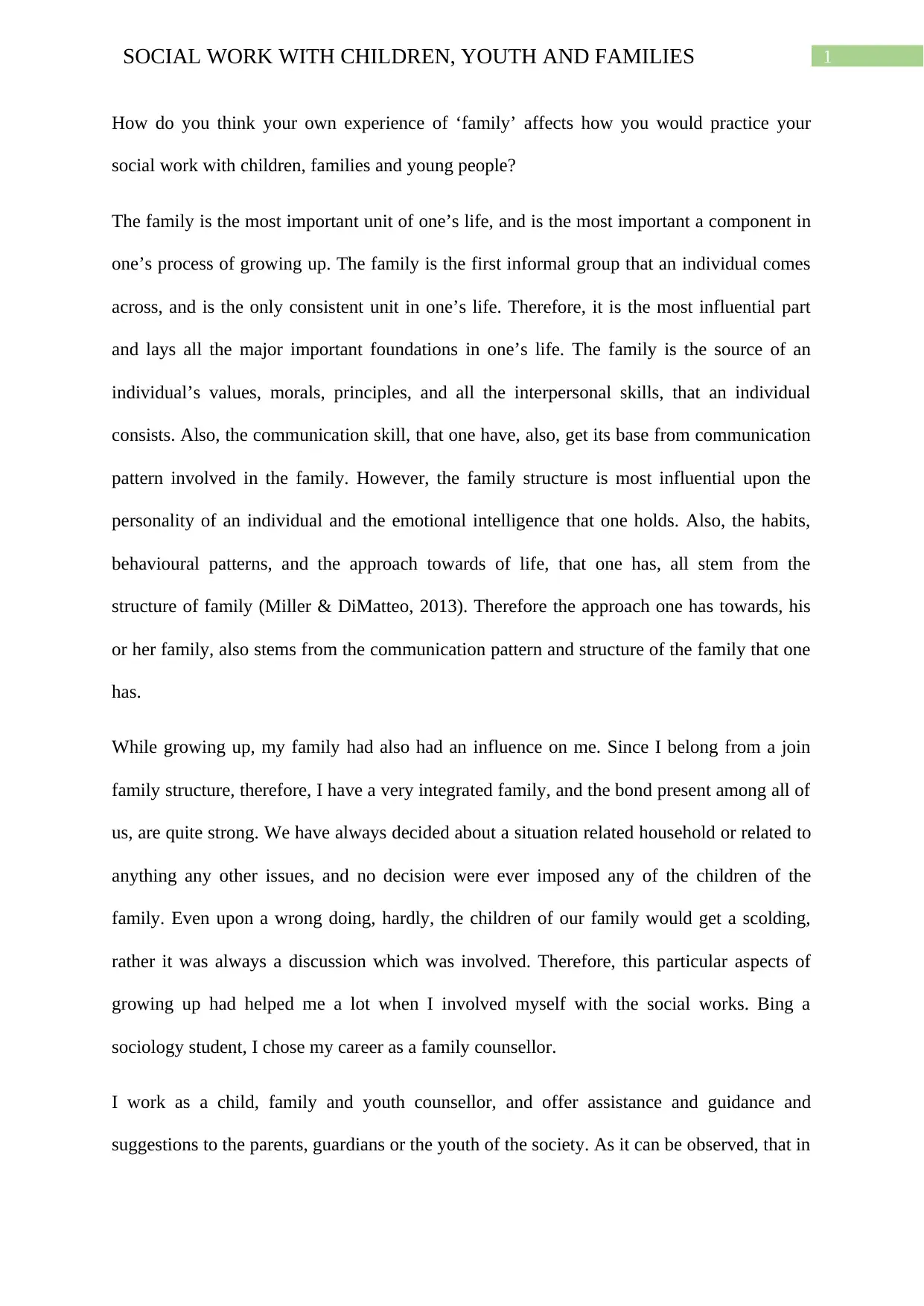
1SOCIAL WORK WITH CHILDREN, YOUTH AND FAMILIES
How do you think your own experience of ‘family’ affects how you would practice your
social work with children, families and young people?
The family is the most important unit of one’s life, and is the most important a component in
one’s process of growing up. The family is the first informal group that an individual comes
across, and is the only consistent unit in one’s life. Therefore, it is the most influential part
and lays all the major important foundations in one’s life. The family is the source of an
individual’s values, morals, principles, and all the interpersonal skills, that an individual
consists. Also, the communication skill, that one have, also, get its base from communication
pattern involved in the family. However, the family structure is most influential upon the
personality of an individual and the emotional intelligence that one holds. Also, the habits,
behavioural patterns, and the approach towards of life, that one has, all stem from the
structure of family (Miller & DiMatteo, 2013). Therefore the approach one has towards, his
or her family, also stems from the communication pattern and structure of the family that one
has.
While growing up, my family had also had an influence on me. Since I belong from a join
family structure, therefore, I have a very integrated family, and the bond present among all of
us, are quite strong. We have always decided about a situation related household or related to
anything any other issues, and no decision were ever imposed any of the children of the
family. Even upon a wrong doing, hardly, the children of our family would get a scolding,
rather it was always a discussion which was involved. Therefore, this particular aspects of
growing up had helped me a lot when I involved myself with the social works. Bing a
sociology student, I chose my career as a family counsellor.
I work as a child, family and youth counsellor, and offer assistance and guidance and
suggestions to the parents, guardians or the youth of the society. As it can be observed, that in
How do you think your own experience of ‘family’ affects how you would practice your
social work with children, families and young people?
The family is the most important unit of one’s life, and is the most important a component in
one’s process of growing up. The family is the first informal group that an individual comes
across, and is the only consistent unit in one’s life. Therefore, it is the most influential part
and lays all the major important foundations in one’s life. The family is the source of an
individual’s values, morals, principles, and all the interpersonal skills, that an individual
consists. Also, the communication skill, that one have, also, get its base from communication
pattern involved in the family. However, the family structure is most influential upon the
personality of an individual and the emotional intelligence that one holds. Also, the habits,
behavioural patterns, and the approach towards of life, that one has, all stem from the
structure of family (Miller & DiMatteo, 2013). Therefore the approach one has towards, his
or her family, also stems from the communication pattern and structure of the family that one
has.
While growing up, my family had also had an influence on me. Since I belong from a join
family structure, therefore, I have a very integrated family, and the bond present among all of
us, are quite strong. We have always decided about a situation related household or related to
anything any other issues, and no decision were ever imposed any of the children of the
family. Even upon a wrong doing, hardly, the children of our family would get a scolding,
rather it was always a discussion which was involved. Therefore, this particular aspects of
growing up had helped me a lot when I involved myself with the social works. Bing a
sociology student, I chose my career as a family counsellor.
I work as a child, family and youth counsellor, and offer assistance and guidance and
suggestions to the parents, guardians or the youth of the society. As it can be observed, that in
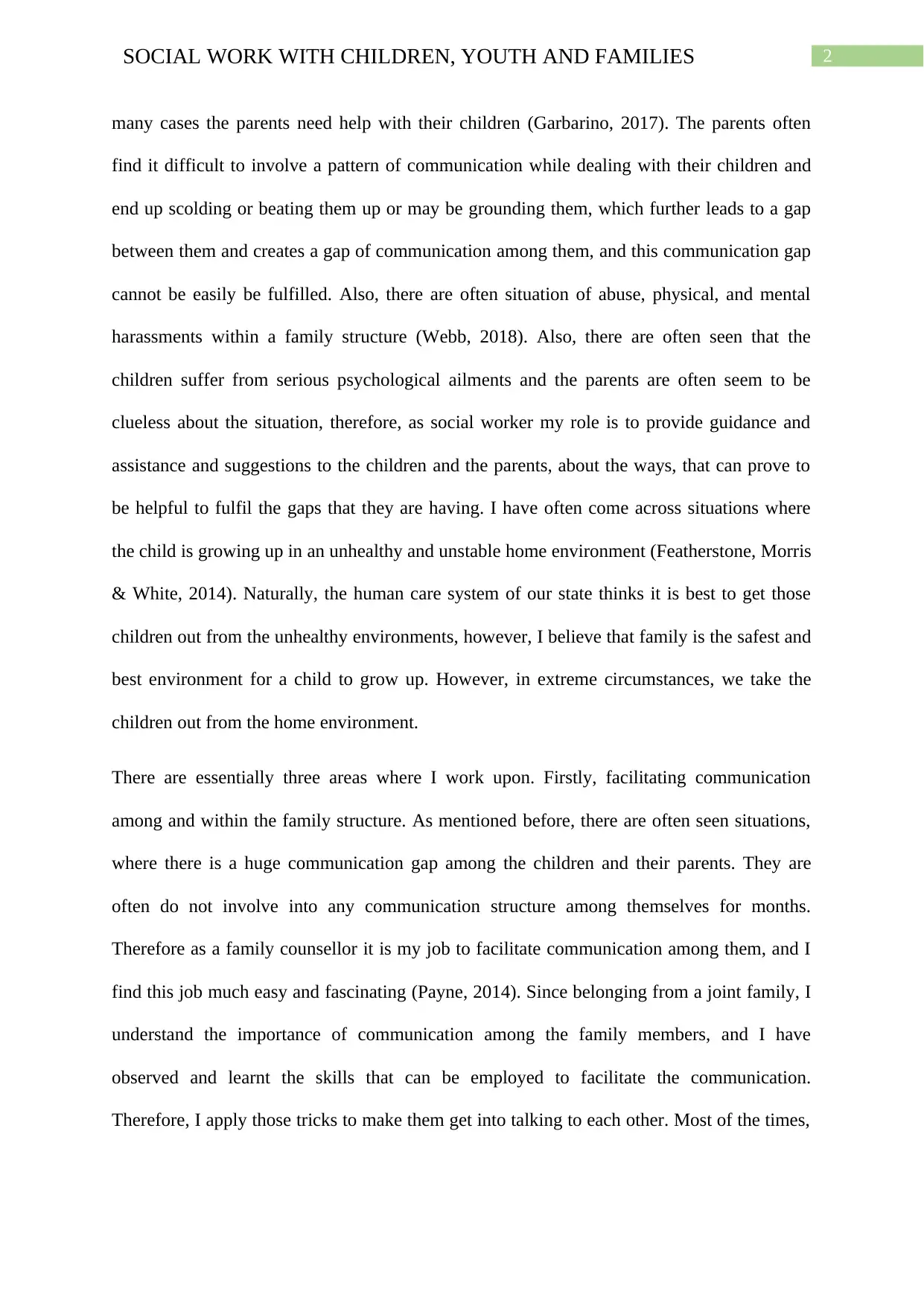
2SOCIAL WORK WITH CHILDREN, YOUTH AND FAMILIES
many cases the parents need help with their children (Garbarino, 2017). The parents often
find it difficult to involve a pattern of communication while dealing with their children and
end up scolding or beating them up or may be grounding them, which further leads to a gap
between them and creates a gap of communication among them, and this communication gap
cannot be easily be fulfilled. Also, there are often situation of abuse, physical, and mental
harassments within a family structure (Webb, 2018). Also, there are often seen that the
children suffer from serious psychological ailments and the parents are often seem to be
clueless about the situation, therefore, as social worker my role is to provide guidance and
assistance and suggestions to the children and the parents, about the ways, that can prove to
be helpful to fulfil the gaps that they are having. I have often come across situations where
the child is growing up in an unhealthy and unstable home environment (Featherstone, Morris
& White, 2014). Naturally, the human care system of our state thinks it is best to get those
children out from the unhealthy environments, however, I believe that family is the safest and
best environment for a child to grow up. However, in extreme circumstances, we take the
children out from the home environment.
There are essentially three areas where I work upon. Firstly, facilitating communication
among and within the family structure. As mentioned before, there are often seen situations,
where there is a huge communication gap among the children and their parents. They are
often do not involve into any communication structure among themselves for months.
Therefore as a family counsellor it is my job to facilitate communication among them, and I
find this job much easy and fascinating (Payne, 2014). Since belonging from a joint family, I
understand the importance of communication among the family members, and I have
observed and learnt the skills that can be employed to facilitate the communication.
Therefore, I apply those tricks to make them get into talking to each other. Most of the times,
many cases the parents need help with their children (Garbarino, 2017). The parents often
find it difficult to involve a pattern of communication while dealing with their children and
end up scolding or beating them up or may be grounding them, which further leads to a gap
between them and creates a gap of communication among them, and this communication gap
cannot be easily be fulfilled. Also, there are often situation of abuse, physical, and mental
harassments within a family structure (Webb, 2018). Also, there are often seen that the
children suffer from serious psychological ailments and the parents are often seem to be
clueless about the situation, therefore, as social worker my role is to provide guidance and
assistance and suggestions to the children and the parents, about the ways, that can prove to
be helpful to fulfil the gaps that they are having. I have often come across situations where
the child is growing up in an unhealthy and unstable home environment (Featherstone, Morris
& White, 2014). Naturally, the human care system of our state thinks it is best to get those
children out from the unhealthy environments, however, I believe that family is the safest and
best environment for a child to grow up. However, in extreme circumstances, we take the
children out from the home environment.
There are essentially three areas where I work upon. Firstly, facilitating communication
among and within the family structure. As mentioned before, there are often seen situations,
where there is a huge communication gap among the children and their parents. They are
often do not involve into any communication structure among themselves for months.
Therefore as a family counsellor it is my job to facilitate communication among them, and I
find this job much easy and fascinating (Payne, 2014). Since belonging from a joint family, I
understand the importance of communication among the family members, and I have
observed and learnt the skills that can be employed to facilitate the communication.
Therefore, I apply those tricks to make them get into talking to each other. Most of the times,
⊘ This is a preview!⊘
Do you want full access?
Subscribe today to unlock all pages.

Trusted by 1+ million students worldwide
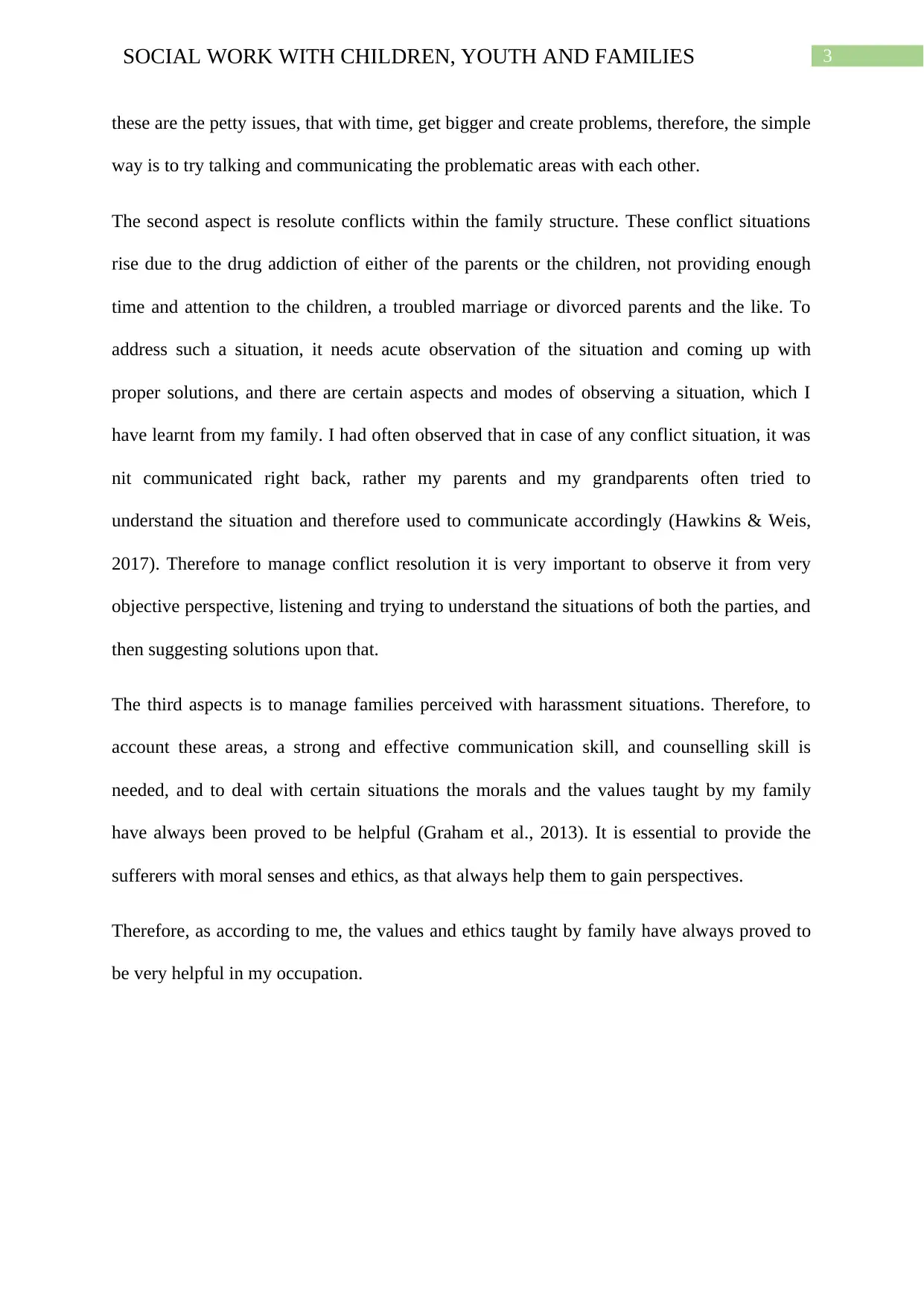
3SOCIAL WORK WITH CHILDREN, YOUTH AND FAMILIES
these are the petty issues, that with time, get bigger and create problems, therefore, the simple
way is to try talking and communicating the problematic areas with each other.
The second aspect is resolute conflicts within the family structure. These conflict situations
rise due to the drug addiction of either of the parents or the children, not providing enough
time and attention to the children, a troubled marriage or divorced parents and the like. To
address such a situation, it needs acute observation of the situation and coming up with
proper solutions, and there are certain aspects and modes of observing a situation, which I
have learnt from my family. I had often observed that in case of any conflict situation, it was
nit communicated right back, rather my parents and my grandparents often tried to
understand the situation and therefore used to communicate accordingly (Hawkins & Weis,
2017). Therefore to manage conflict resolution it is very important to observe it from very
objective perspective, listening and trying to understand the situations of both the parties, and
then suggesting solutions upon that.
The third aspects is to manage families perceived with harassment situations. Therefore, to
account these areas, a strong and effective communication skill, and counselling skill is
needed, and to deal with certain situations the morals and the values taught by my family
have always been proved to be helpful (Graham et al., 2013). It is essential to provide the
sufferers with moral senses and ethics, as that always help them to gain perspectives.
Therefore, as according to me, the values and ethics taught by family have always proved to
be very helpful in my occupation.
these are the petty issues, that with time, get bigger and create problems, therefore, the simple
way is to try talking and communicating the problematic areas with each other.
The second aspect is resolute conflicts within the family structure. These conflict situations
rise due to the drug addiction of either of the parents or the children, not providing enough
time and attention to the children, a troubled marriage or divorced parents and the like. To
address such a situation, it needs acute observation of the situation and coming up with
proper solutions, and there are certain aspects and modes of observing a situation, which I
have learnt from my family. I had often observed that in case of any conflict situation, it was
nit communicated right back, rather my parents and my grandparents often tried to
understand the situation and therefore used to communicate accordingly (Hawkins & Weis,
2017). Therefore to manage conflict resolution it is very important to observe it from very
objective perspective, listening and trying to understand the situations of both the parties, and
then suggesting solutions upon that.
The third aspects is to manage families perceived with harassment situations. Therefore, to
account these areas, a strong and effective communication skill, and counselling skill is
needed, and to deal with certain situations the morals and the values taught by my family
have always been proved to be helpful (Graham et al., 2013). It is essential to provide the
sufferers with moral senses and ethics, as that always help them to gain perspectives.
Therefore, as according to me, the values and ethics taught by family have always proved to
be very helpful in my occupation.
Paraphrase This Document
Need a fresh take? Get an instant paraphrase of this document with our AI Paraphraser
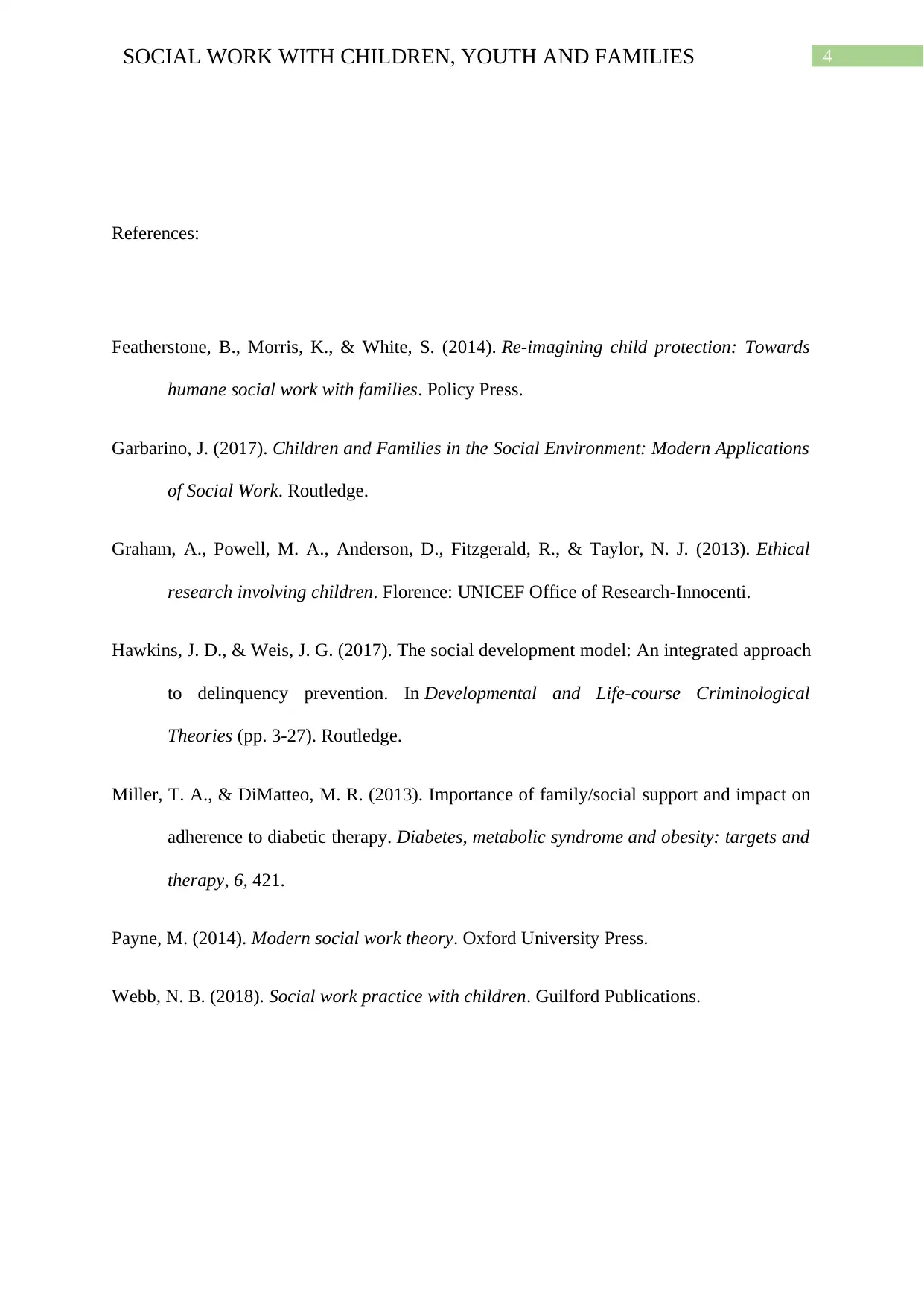
4SOCIAL WORK WITH CHILDREN, YOUTH AND FAMILIES
References:
Featherstone, B., Morris, K., & White, S. (2014). Re-imagining child protection: Towards
humane social work with families. Policy Press.
Garbarino, J. (2017). Children and Families in the Social Environment: Modern Applications
of Social Work. Routledge.
Graham, A., Powell, M. A., Anderson, D., Fitzgerald, R., & Taylor, N. J. (2013). Ethical
research involving children. Florence: UNICEF Office of Research-Innocenti.
Hawkins, J. D., & Weis, J. G. (2017). The social development model: An integrated approach
to delinquency prevention. In Developmental and Life-course Criminological
Theories (pp. 3-27). Routledge.
Miller, T. A., & DiMatteo, M. R. (2013). Importance of family/social support and impact on
adherence to diabetic therapy. Diabetes, metabolic syndrome and obesity: targets and
therapy, 6, 421.
Payne, M. (2014). Modern social work theory. Oxford University Press.
Webb, N. B. (2018). Social work practice with children. Guilford Publications.
References:
Featherstone, B., Morris, K., & White, S. (2014). Re-imagining child protection: Towards
humane social work with families. Policy Press.
Garbarino, J. (2017). Children and Families in the Social Environment: Modern Applications
of Social Work. Routledge.
Graham, A., Powell, M. A., Anderson, D., Fitzgerald, R., & Taylor, N. J. (2013). Ethical
research involving children. Florence: UNICEF Office of Research-Innocenti.
Hawkins, J. D., & Weis, J. G. (2017). The social development model: An integrated approach
to delinquency prevention. In Developmental and Life-course Criminological
Theories (pp. 3-27). Routledge.
Miller, T. A., & DiMatteo, M. R. (2013). Importance of family/social support and impact on
adherence to diabetic therapy. Diabetes, metabolic syndrome and obesity: targets and
therapy, 6, 421.
Payne, M. (2014). Modern social work theory. Oxford University Press.
Webb, N. B. (2018). Social work practice with children. Guilford Publications.
1 out of 5
Related Documents
Your All-in-One AI-Powered Toolkit for Academic Success.
+13062052269
info@desklib.com
Available 24*7 on WhatsApp / Email
![[object Object]](/_next/static/media/star-bottom.7253800d.svg)
Unlock your academic potential
Copyright © 2020–2026 A2Z Services. All Rights Reserved. Developed and managed by ZUCOL.





